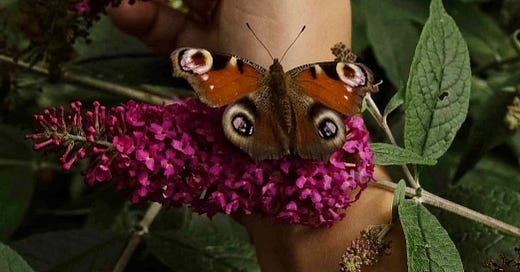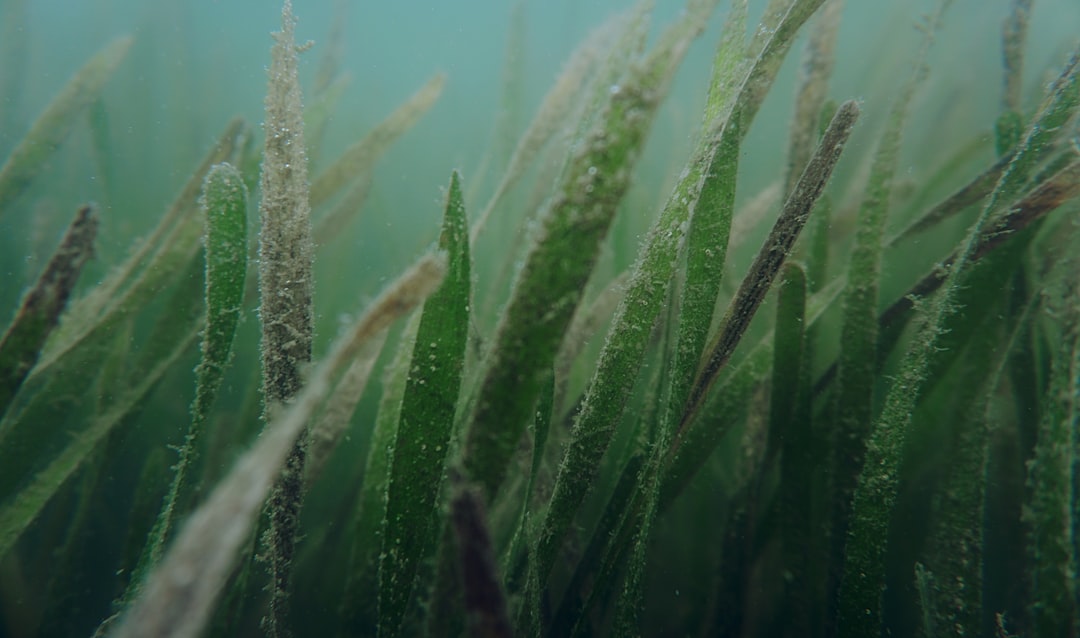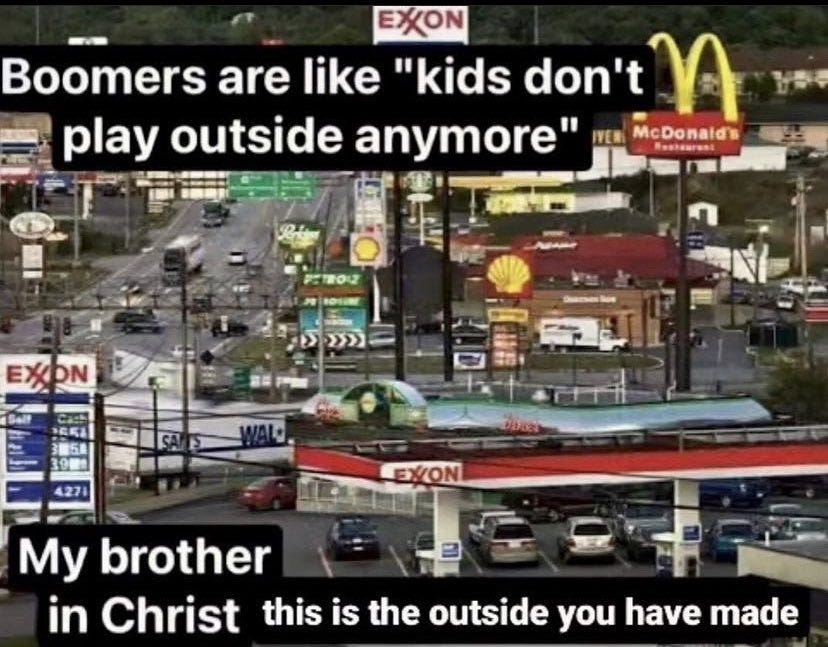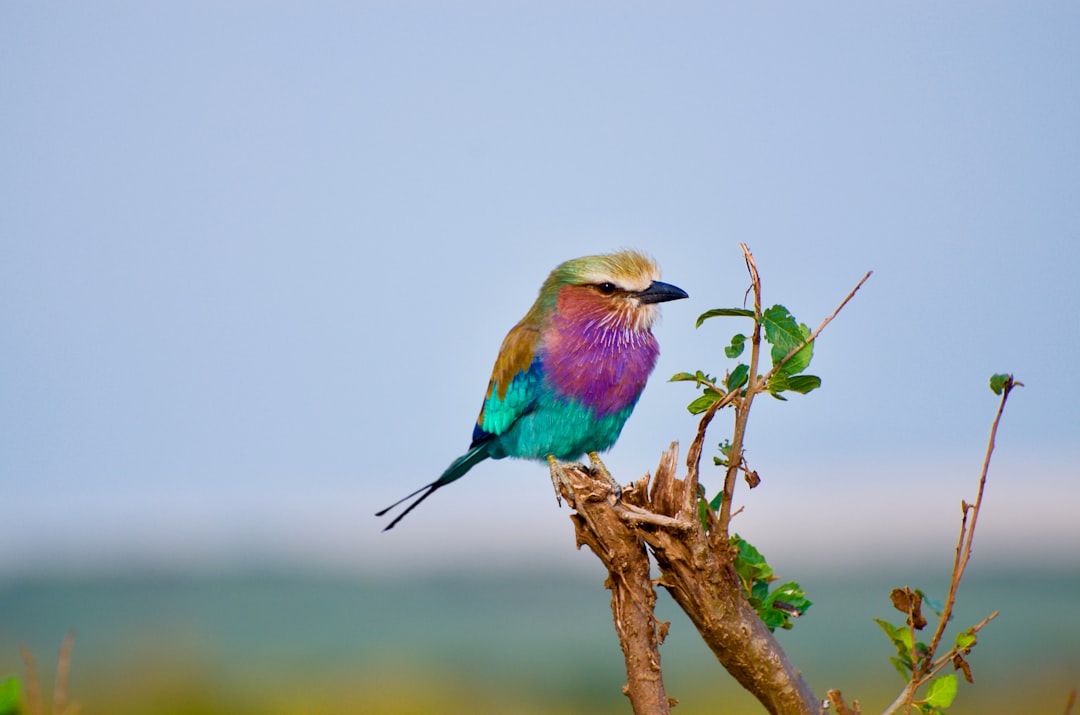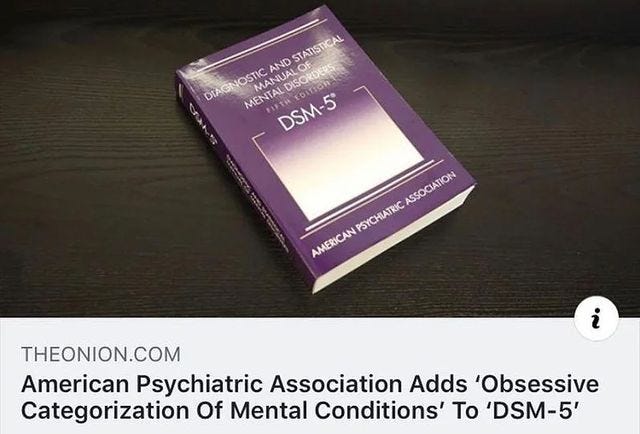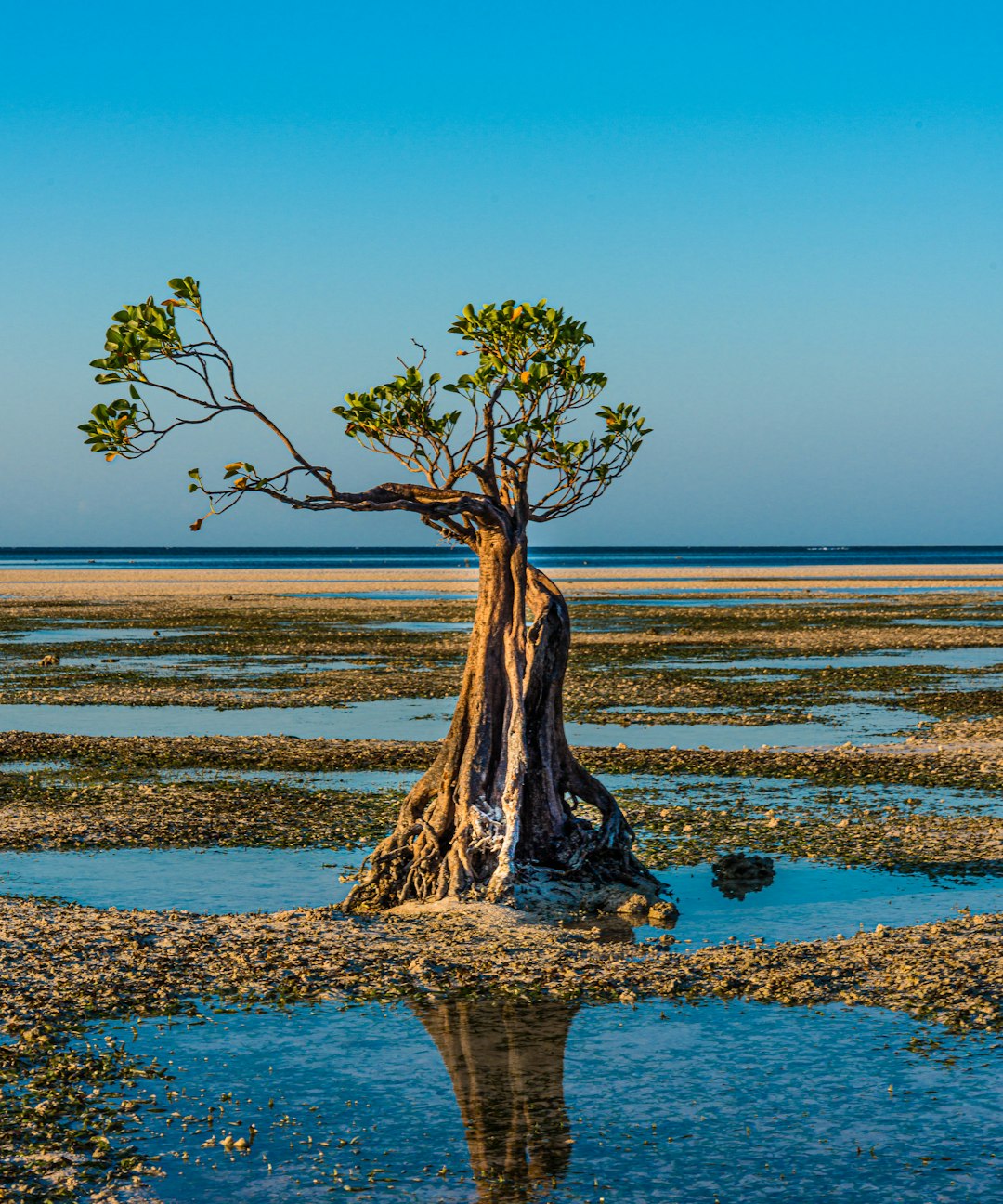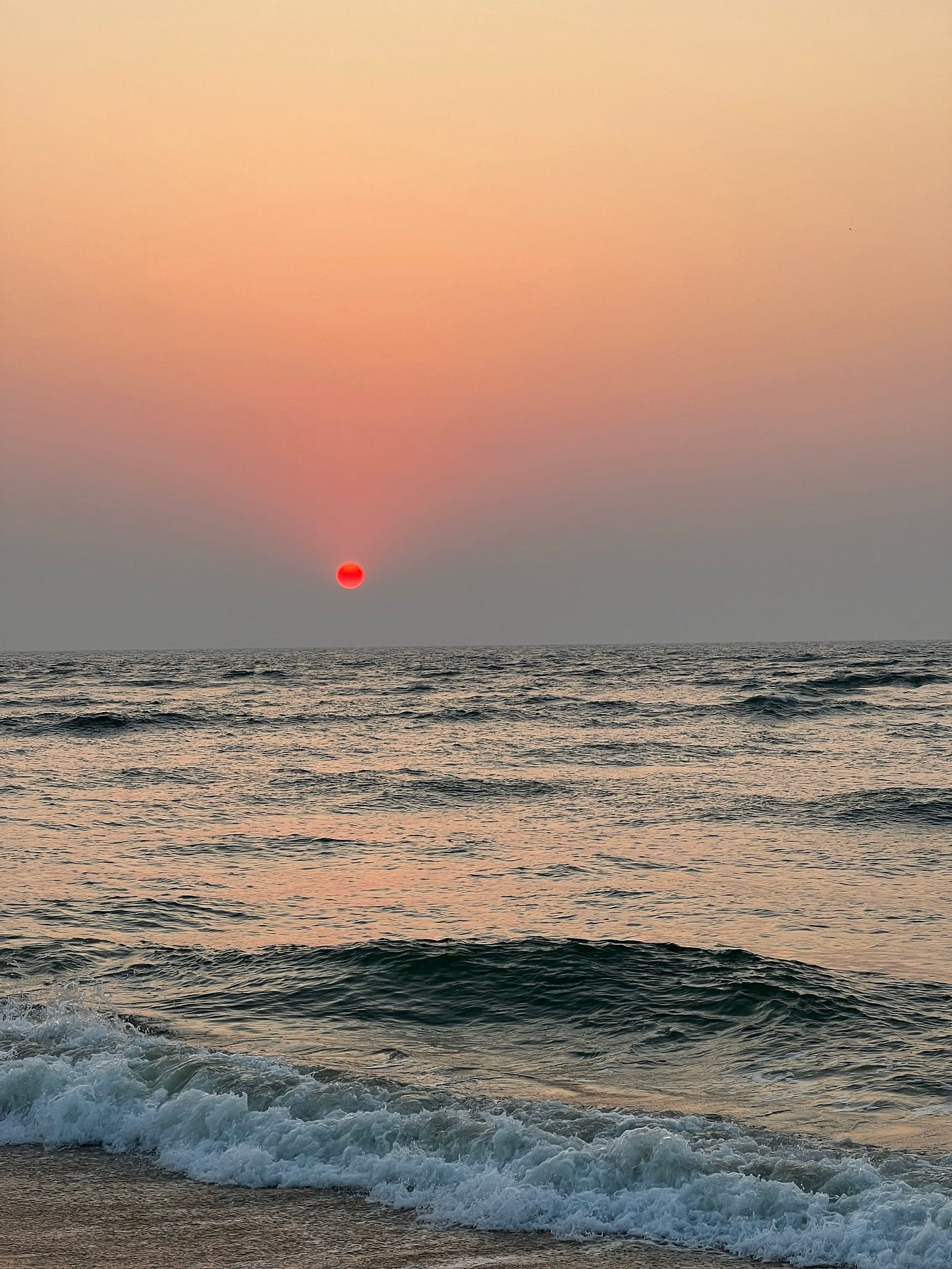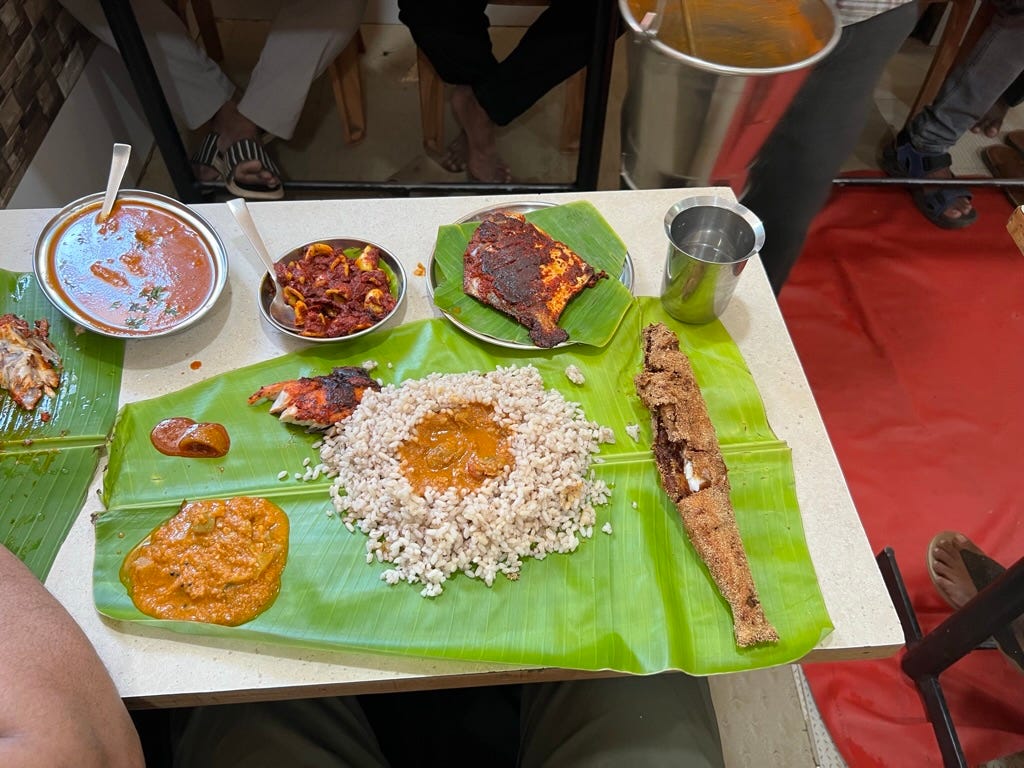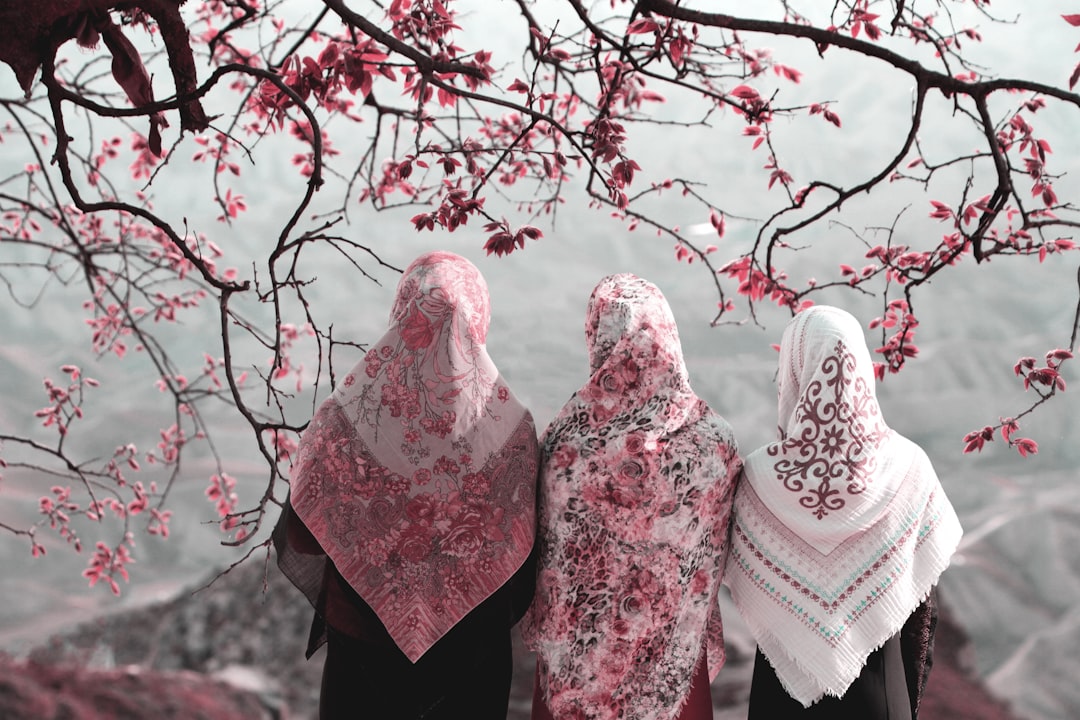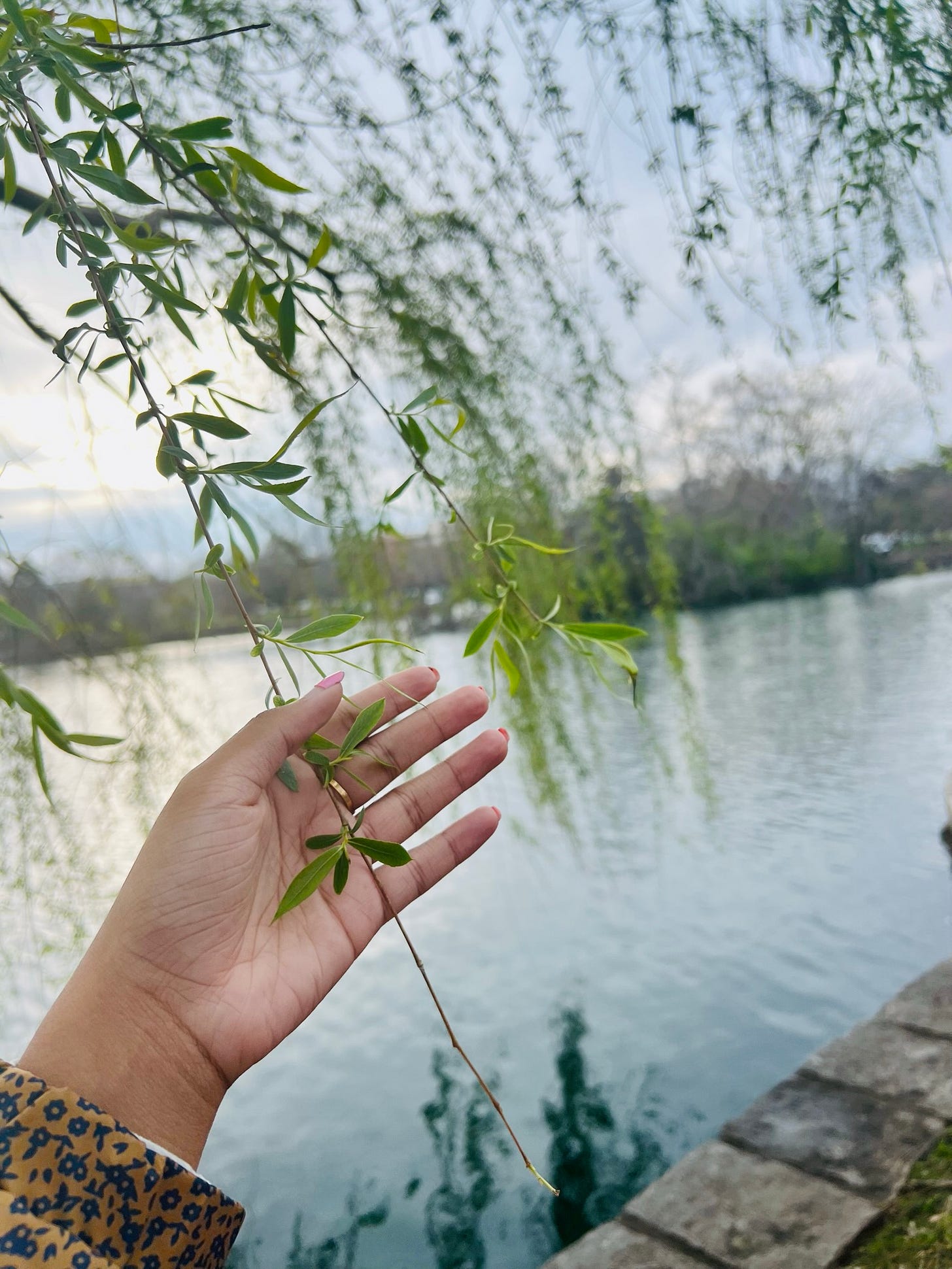Capitalism overwhelms our senses while also insulating us from the connection we need
How do we use our senses to intentionally connect with our ecosystems?
6 weeks ago, I was walking around barefoot on the luscious, alive, coastal, forest floor of the Western Ghats. I returned to South India to our island village (Bengre) for the first time in 8 years and my body remembered what it was like to be grounded & rooted in soil. As I was briefly shielded from the overwhelming sights, sounds & smells of capitalism… my eyes, ears, nose, tongue, skin, hair, hands, feet, mind & soul were viscerally reminded that we are meant to be fully immersed in our ecosystems, not insulated from them.
Everyday I dove into the turbulent, rocky estuary waters where the fresh mountain river collided with the salt of the Indian ocean/ the Arabian sea. At first I was hesitant, scared, saddened & confused that the sensations I once called “home” now felt foreign, unfamiliar & jarring. I wanted to go “back inside”, push people away & have more solitude— my body was conflating the normalized alienation that comes with living under capitalism with safety. Why? How? I was crushed that my own mother-land felt “other” to me. But as I was held in community who assured me that the land held me even when I was gone, my body learned to be entwined & deeply embedded in the webs of nature again. I was part of the land & ocean, not detached & disconnected from them as I often feel here in the United States (though this is shifting & I’ll elaborate in a bit).
Today, I want to dive into the details, & granularity of how the sensory stimulation from capitalism/ colonialism impacts our bodies and what liberation should feel like. How can we cope with the overwhelming stimuli we’re constantly ingesting or absorbing depending on our context? What sensory input do we actually need?
TABLE OF CONTENTS:
The return to concrete jungles from actual jungles
The overwhelming & alienating sights, sounds, smells & tastes of capitalism
From Sensory Processing Disorder to Autism/ ADHD/ OCD/ anxiety— the widespread pathologization of sensory overload under oppression
Wtf are these vague, depoliticized grounding exercises even about?
The sensations of community & connection to the land
Using our senses to connect and ground in community & our ecosystems
Pushing past the alienation
Babysteps
Paid subscribers: Why is focusing on our senses so important? (with a reflection exercise)
A note on time & capitalism’s sense of urgency
PLUS: Pictures capturing healing sensations from India to Nashville
Note: Since we all perceive the world differently— I’m going off of the senses that I have access to but these lessons apply to all of us including disabled folks who may have sensory impairments or restricted mobility under capitalism. There is no specific individualized “normal” or “right” way to sense. It is also on us to care for each other in complex, expansive ways which ultimately is how we find our place within nature rather than just getting “access” to it as a privilege.
1. Returning to the concrete jungle & heart of the empire
I didn’t want to leave our small, isolated, jungle island village and return to barren yet crowded concrete jungles but I had to. As my flight landed on the hard concrete airport runway in NYC, the wave of colonial capitalism’s sensory overload hit me almost immediately. My jolted body retreated inward, put up protective walls, pulled away & went back to trying to tune it all out. My spirit was crushed… so fast I barely realized it. As I transited back to Nashville and went back to work at the hospital again, my body went from being surrounded by serenity, community & connection in Bengre to again being inundated, submerged, thoroughly consumed & engulfed by.. what I now call- the sights, sounds, smells, tastes & sensations of capitalism/ colonialism.
The polluted air clogging my lungs, the masses of people clustered in close proximity yet strangers to each other, inescapable noise of construction or traffic… it all feels too much. At the same time, I subliminally felt the absence of the sights, sounds, smells, tastes & sensations that signal community, nature, land, or safety to my body. Amidst the bustling crowds, I felt alone & then it hit me… I’ve had a lot of practice insulating/ dissociating/ numbing/ isolating myself from my environment as a byproduct of living in a capitalist society but far less experience intentionally reaching out into my surroundings with a desire to connect using all my senses, the entirety of my body & soul to fully perceive the world. I had some practice building community & connection despite capitalism. But now it is so apparent that capitalism BOTH overwhelms us & strategically insulates us at the same time from the things we need to sense to be grounded.
What sensory inputs are we receiving under capitalism & how are we impacted by them? How can we collective be more active rather passive in seeking the sensations that facilitate connection to each other & the land… the sensations we truly need to feel alive? What do we need to hear/ see/ taste/ touch/ smell/ feel/ sense to be free?
Capitalism/ colonialism try to sever our ties to each other & the rest of the natural world. We’re taught to perceive the world around us as “the other”— distinct, separate, foreign, different, alien. I was a kid that felt the safest when I was covered in dirt, naked feet planted firmly in comforting mud, surrounded by the loud, boisterous, vibrant chatter of community & the traditional music of our maximalist, collectivist cultures. Today, I often feel like the world is too loud, too bright, too much for me in many ways. But then I ask, is it the world itself that is overwhelming me? Can I reduce everything that is beautiful about this world to a blanket, reductive notion that “it is all too much”? How did that kid who’s instinct to connect with the world was to immediately taste, smell, touch something… get here? The more important question is- what HAPPENED to that kid along the way?
Quick aside: You can now sign-up for the April Heal in Community session!
P.S. Thank you to the folks who pay to support this work. I can do this in part because of your generosity. If you aren’t already & are able to—
2. Sights, sounds, smells & sensations of capitalism
I am writing part of this piece sitting in my crammed cubicle in the shared fellows office in the hospital. This is what I sense around me here: the roaring, blaring, mechanical noise of construction outside with the many massive machines drilling & plowing into the Earth (the grrrrrrrrrrrr sound of industrialization you may always be around if you live in a city), the constant inescapable hum of air conditioning units blasting frigid air as I’m sitting on a chair bundled up in 4 layers insulating myself as much as possible, the never-ending workplace chatter with multiple meetings happening at the same time/ urgent calls/ deadlines/ despair over patients we can supposedly do “nothing” for or superficial small talk, the incapacitating bright white light glaring over my head, & the sterile stench of bleach mixed with unidentifiable disturbing scents. I’m fasting. I look over at a fellow in another medical specialty sitting in the cubicle next to me with oil-soaked noodles & chicken from our unappetizing hospital cafeteria plopped open as he is chugging coffee & cramming in work at the same time to try to make it home to his kid before sunset. There is one window across the room & it faces a solid, red brick wall… nothing else.
I wrote the rest of this in my apartment where I can hear countless cars honking loudly or their engine’s ear-splitting vroom vroom as they zoom down the highway, more construction, and the palo santo incense I lit to mask the pungent scent of diesel coming thru our window from the gas station next door. I look outside & all I see is concrete, cement buildings, mowed down sterile lifeless lawns, innumerable parking spots, cars cars cars, electrical wiring & bulky mechanical equipment crowding every empty space available on/ in/ next to buildings and oddly curated shrubs or unnaturally planted trees hoisted outside store fronts meant to merely act as enticing ‘aesthetics’ for passing consumers… I see/ hear/ smell/ sense so much movement & industrial activity but don’t sense any real semblance of life.
2a— Sensory Processing Disorder & the many disorders that pathologize sensory overload under capitalism
Our diverse ways of being that diverge from dominant norms + logical human responses to or adaptations under capitalism/ colonialism are pathologized and designated as symptoms under an array of disorders. “Sensory overload” or “overstimulation” is one such bucket of symptoms that spans diagnoses- from autism, ADHD, OCD to schizophrenia, PTSD & anxiety disorders. Around 3/4th of the DSM V disorders include sensory “dysfunction” of some sort as primary diagnostic criteria. There is a push for the official recognition of the new “Sensory Processing Disorder” which seems to be any sensory issue that doesn’t neatly fall into one of the aforementioned disorder categories. There are always new disorders dropping as psychiatry finds increasingly mind-bending ways to reduce collective, widespread distress under brutal systems to individual “abnormal” neurological defects.
Sensory processing disorder is defined as “difficulties in detecting, modulating, and interpreting sensory stimuli to the extent of causing impairment in daily functioning and participation”. Anything that impedes our ability to conform, obey & comply with capitalism or the oppressive rules of the state can be classified as an abnormality. Our health is measured by our productivity & success at school or work. Disordered/ disabled individuals are funneled into institutions that aim to discipline, “rehabilitate” & cure us back into conformity under the guise of healthcare or humanitarian accommodations.
“Symptoms include abnormal reactions, such as heightened or reduced emotional, behavioral, or psychological responses to sensory stimuli at normal intensities.” Just sit for a moment & imagine the full sensory experience of what it feels like for every cell in our body when we enter a grocery store, any overcrowded public space, sit in creeping traffic for hours, work in enclosed spaces with artificial piercing light without sunlight etc. These are supposedly “normal” sensory stimuli. It is no mark of wellness or health to be profoundly well-adjusted to these stimuli.
2b— Vague, depoliticized grounding techniques
Grounding exercises like the “5-4-3-2-1 technique” have been widely popularized in mainstream mental health culture. Here’s a general description of these:
“First, you may want to start with a simple deep breathing exercise called the 5-5-5 method. To do this, you breathe in for 5 seconds, hold your breath for 5 seconds, and then breathe out for 5 seconds. You can continue this process until your thoughts slow down or you notice some relief. When you can find your breath, try practicing the 5-4-3-2-1 technique. For that, you want to look around and focus on: 5 things you see, 4 things you feel, 3 things you hear, 2 things you smell, 1 thing you taste. The idea is that the 5-4-3-2-1 technique helps you shift your focus to what’s currently happening around you instead of what’s making you feel anxious.”
& so here we are, metaphorically or literally hunched over, in our lonely corners, mid-panic attack/ mid-dissociation or mid-suicidal ideations, trying to 5-4-3-2-1 our way to relief. I’ve always wondered why these short tips, tricks & “exercises” never worked for me. I now realize it’s because they never gave me the context I needed to understand why dissociation was the most common coping mechanism under capitalism or why I struggled to ground myself in anything or why I was experiencing such sensory overwhelm or distress in the first place.
Can I really 5-4-3-2-1 my way to serenity in a confined, enclosed, crammed in cubicle which I am in because I am a cog in the workplace (medical industrial complex machine) & have to earn the right to live? Can I “self-regulate” in the corner of my apartment when I’m cut-off from all the things I need to survive… like the nourishment any plant would need to survive? What exactly am I supposed to ground INTO?
This is not to say that deep breathing doesn’t help. Even when things are relatively calmer, I have a tendency to re-create “fight or flight” mode in my body by holding my breath, taking fast-paced shallow breaths, pacing to increase my heart rate etc because that state is so familiar to me. I’m learning to inhale deeply & exhale slowly… but these tips & tricks in isolation do little to alleviate our pain sustainably. We need each other. We need the land. We need to practice connecting BECAUSE it isn’t intuitive under systems primed for disconnection, detachment, separation & severance. My nervous system’s overwhelm or my immune system’s chronic inflammation are logical responses to living in an overwhelming, brutal & chronically stressful society. But I need more than just the absence of these stressors to cope, heal or want to live— I need the PRESENCE of things. Thinking about this through a political, decolonized, anarchist & cultural lens, I’m always back to a simple question— “What do we need to survive and thrive?” & the answer is community & connection to land. Community & our ecosystem are meant to be our anchors that ground us to life.
3— The sensations of connection & community
When I was in Bengre, connection was the norm & we were the land. One thin road cuts through the long island and cars are a rare occurrence. No major industrial factory or grocery store exists on our land. No buildings. Our homes are built 50 ft from the water— some of us face the ocean while the rest face the river. I slept & woke up to the sound of the gushing ocean waves crashing into the jagged rocks or sweeping onto the grainy sand shore lined with coconut palms rustling loudly in the decadent winds that descended from the mountains.
Our homes are built to connect us with the land, not insulate us from it. I was surrounded by community all day as our routines synchronized with the cycles of nature. Time is slow. The structure of time is defined by sunrise, sunset, high tide, low tide, seasonal harvest or other land & ocean tending based clocks rather than 9-5 monotonous jobs baked into a regimented, jam-packed, accelerated, tasks/ meetings filled routine sandwiched between intense burnout. Our daily spiritual rituals include multiple grounding communal prayers at the open air temple or cozy masjid, land offerings or community theatre where we heal by honoring our traditional artistic & creative traditions. Our kitchens are open & we process our base ingredients outside where our fishing boats are docked.
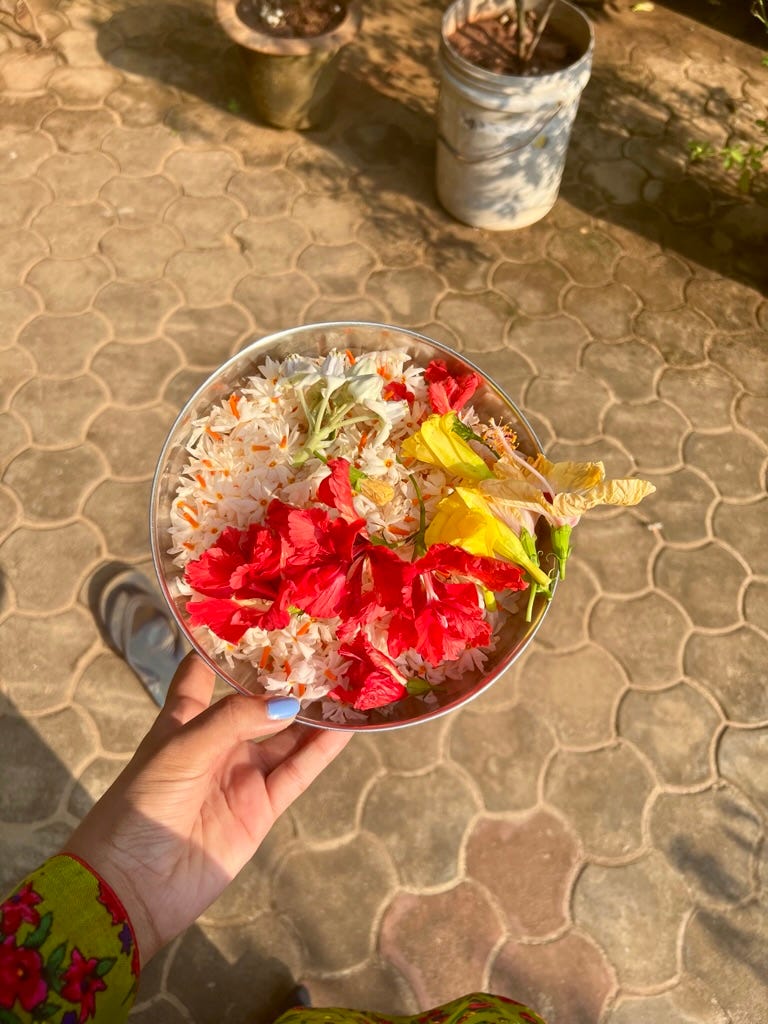
Our maximalist cultures have a massive variety of ancestral spices, herbs, processing or cooking techniques that require us to get our “hands dirty”. I have to use my whole body & tune into the details of our ecosystem— scaling the tall slender trunks of coconut palms to harvest the best coconuts for our specific needs just based on how they look, smell, sound like or feel, knowing when the complex blend of countless freshly harvested herbs & spices come together just right, or tending to the soil by tuning in to the most minute changes. I have to be present & so I practice paying close attention to the land I’m on, the cultural ritual I’m engaging in or the people around me.
I’m not going to glorify or idealize community either. There are problems— systemic problems that have trickled down into our relationships & woes of capitalism/ colonialism that we’re still fighting. But despite that, the collectivist context of our daily lives made it nearly impossible for me to feel totally disconnected from community or land.
4a— Pushing past alienating silences
Here in the middle of a city, when I’m not engulfed in industrial noise, strange crowds, bright lights & toxic fumes, I am consumed by alienating silences.
In Bengre, “silence” still meant I continuously heard the ocean, soothing bird calls, critters & various fauna signaling the thriving life in our biodiverse ecosystem, the distant laughter of neighbors, faint murmurs of my grandma reciting a pooja (prayer) outside as she sprinkles blessed flowers on the soil, the distant Adhan (muslim call to prayer) that resonates across the village 5 times a day, the peaceful swishing of ancient trees in the wind and the faded churning of the large mortar & pestle we use to make fresh spice blends foreshadowing the coming of a delicious communally prepared meal. I did not feel “alone”. Even in silence, I was reminded that community is near & the land is with me. These silences still signaled serenity & belonging to my body.
Here in Nashville, silence can be… lonely. This is when the heaviest of burdens can seem too much to bear… because I was never meant to carry them alone. I was never meant to live in hyper-segregated, nature-proof cement boxes or feel like community is out-of-reach but given that many of us do experience such fabricated isolation (urban or more rural)… how can we push past capitalism’s sensory overload, cut out the soul-numbing nonsense that is meant to harm us while also reaching for life-sustaining, life-giving sensations that make us want to wake up every morning?
Learning to use our senses as pathways of connection
Capitalism doesn’t make it easy for us to reach for each other. From school, the media to maybe even in most households, many people were not taught how to identify, carry or process our emotions communally. Oppressive systems don’t teach us how to use our senses as passages & enablers of connection to our collective body- i.e. other people & all components of the land. They don’t teach us how to build community, forge & sustain healthy relationships, grow food & stewards our lands responsibly— but why would they? These things would liberate us. When I’m at my most vulnerable, my instinct is to merely numb myself, tune out the world, self-isolate & retreat into a corner… but now, I try not to. I try to reach out.
I’m learning to slowly use my senses to more intentionally relate to the parts of my ecosystem that I desperately need a connection with. Rather than just mechanically studying, reading about or dissecting nature in a way where it remains a mere object of my fascination or something I can intellectually “conquer”, I try to be a part of it. Rather than just observing native plants from a distance, I approach them as kin— with admiration, respect, gratitude. I smell or gently cradle them in my palms. I watch them keenly to learn from them or pray to them, I give nourishing land offerings when I can so I can aid their growth & I’m open to them transforming me.
Babysteps
It saddens me that something that was once intuitive to me back home has become more foreign to me the longer I’ve lived in the heart of the empire. I’m also incredibly hopeful because just being in Bengre for a couple of weeks transformed my health & wellbeing significantly which reminded me that culture/ land/ community are profoundly powerful forms of medicine that can ground me- even here in Nashville.
Despite the dungeons of the hospital or the concrete jungle I’m forced to dwell in for now, my body & soul yearn for the sun’s rays to grace my skin, I ache for the fragrance of ancient spices at the immigrant grocery store, with every fast I break this Ramadan- I close my eyes to wholly relish the first sip of water & the first bite of a succulent date that reminds me of the Arab/ Persian/ Levantine/ North African deserts that once fostered me as a migrant, my muscles relax at the lighting of incense as classical South Indian music plays in the background sufficiently masking the otherwise incessant highway sounds, & my feet that are normally wrapped in socks indoors instantly feel relief when they make contact with the soil of the lush prairie at the nearby park covered in native wildflowers.
I’m learning how to love— how to love people in equitable/ reciprocal relationships, how to love the land tangibly such that I’m not merely expecting it to sustain me without trying to care for it, how to love community even when there are hardships or conflict. I’m learning to love the natural world around me by using my senses as pathways of connection.
As my hands caress the ingredients of a traditional meal I’m preparing in my apartment kitchen & as I massage the slowly marinated sustenance from the land, I’m whole again. I may not be living in a communal house like in Bengre where people’s presence is always felt, but I prioritize spending time with my friends here. When I’m surrounded by the voices, laughter & banter of my friends at our shared meals or in our emotional conversations filled with grief & hope… I forget about capitalism… even if for a moment. When I’m in truly equitable relationships, I feel the presence of my loved ones even in their physical absence. When I’m using every sensory nerve & cell in my body to be present in the joy that is in front of me, I can feel our ancestors smiling. Our ancestor’s wildest dreams were not to see us conform, climb the ladder or succeed & “make it” under oppressive systems- they wanted us to be with each other. They wanted us to care for each other & honor the divinity of the land.
So… let’s try.
Keep reading with a 7-day free trial
Subscribe to Cosmic Anarchy to keep reading this post and get 7 days of free access to the full post archives.

